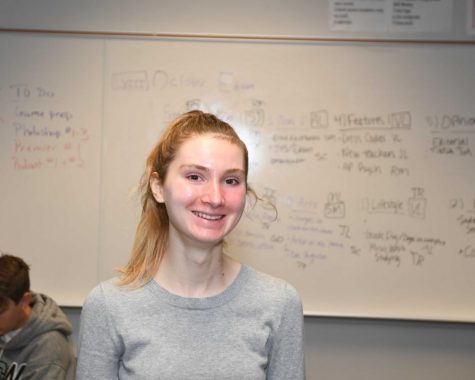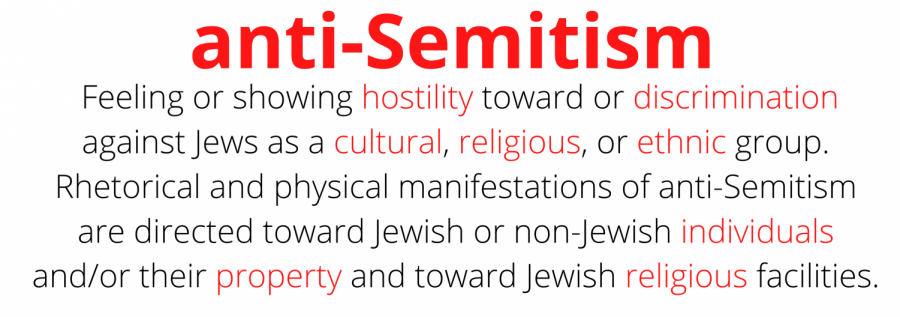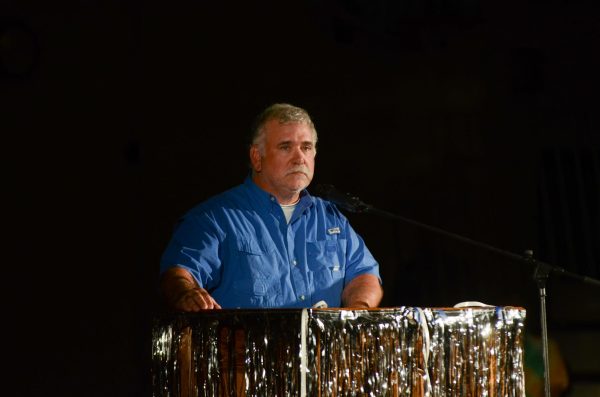Anti-semitism is troublingly normalized in Jesuit’s discourse
In my Comparative Religions class last semester, there was an unmistakable decline in courtesy among some of my classmates when we reached our unit on Judaism. A group of senior guys jeered at basic Hebrew words we learned, pronouncing them with comic exaggeration. When a Jewish guest speaker explained her religious traditions, her display of Jewish symbols was met with scornful trivialization by those same boys.
Pondering their escalating disrespect, unattended to by my teacher and even my most justice-oriented classmates, I knew there was something more than broad cultural ignorance at play. An equivalent level of disdain when learning about Islam, for example, would have propelled resounding accusations of bigotry. Why, then, did this display of anti-Semitism receive no rebuke?
Senior Jane Koontz notes that more worrisome and overt displays of anti-Semitism have occurred during her time at Jesuit, such as an incident that occurred on her brother’s sophomore overnight for which the culprit received no punitive response.
“My brother went on his sophomore overnight retreat, and someone drew swastikas all over his poster,” Koontz said. “Another time, it was overheard that someone in our class was coming up with all the Jew jokes he could think of just to piss [a Jewish student] off. His words were, ‘I wanna see if I can trigger them, so tell me if these are good.’”
The number of students at Jesuit who explicitly identify as Jewish is estimated at less than 10, which means that in most cases, when other students perpetuate anti-Semitic tropes, no Jewish students are in the classroom to take offense—or to correct the narrative. Nevertheless, mockery of Jews is far more widely tolerated in our discourse, resulting in a culture that enables anti-Semitic microaggressions in Jesuit’s classrooms and more explicit displays in hallways and on retreats.
In America at large, anti-Semitic attacks make up a disproportionate and increasing percentage of hate crimes. New York in 2019 reported its largest number of hate crimes since 1992. In 2018, more hate crimes were committed against American Jews than any other demographic in the U.S., with 835 separate incidents reported to the FBI.
With anti-Semitic violence escalating around the country, it’s worth examining what patterns of behavior or assumptions foment violence and, more commonly, prompt routine, obvious microaggressions against Jewish people. Particularly in the U.S., widespread misunderstanding revolves around the notion that most Jews are not just practitioners of Judaism, but ethnically Jewish.
Due to widespread segmentation and segregation among Jewish communities primarily in Eastern and other parts of Europe for the past millennium, those with Jewish heritage have a set of identifiable genetic characteristics alongside shared religious and cultural traditions. Oftentimes, the simultaneous racial and religious definition of what it means to be Jewish creates conflict with those of other religious traditions, including Jesuit’s own Catholic community.
“I’ve heard, just walking into school, people saying, ‘how is Judaism a culture? That’s like saying because I’m Christian, that’s my culture and ethnicity,’” senior Jane Koontz said. “They’re taking a very opinionated stance on something they know little to nothing about.”
Beyond widespread ignorance about the ethnic contours of the Jewish identity, rising political tensions over the Israel-Palestine conflict have also unleashed hostility against Jews. Senior Alyssa Knudsen emphasizes that while Jews tend to support Israel and Jewish people’s right to exist in their homeland, that political stance doesn’t give students a right to hurl arguments at Jewish students about a sensitive political divide.
“I’ve had 3 or 4 people come up to me who I don’t know and they demand an explanation for the Israel-Palestine conflict,” Knudsen said. “I’m happy to be a resource for educational purposes, but I am not going to put myself in a position where I am verbally harassed in person and online.”
With being one of a mere handful at Jesuit comes a disproportionate amount of responsibility, spotlight, and perpetual expectation for Jewish students. Students who outwardly identify as Jewish are often expected to singlehandedly educate their peers, a burdensome assumption that only heightens Jewish students’ cultural otherness at a school where 69% of students identify as Catholic. (JHS Academic Snapshot)
“There are questions coming up about Palestine and Israel, but it’s not up to that student to educate others on everything that’s going on over there,” Diversity Director Mrs. Lowery said. “If you’re being asked questions sometimes it’s hard to carry that weight of being one of very few here. Sometimes you want to be the educator, but that gets exhausting, and you don’t always want to have these conversations.”
In light of misinformation and tension surrounding the Israel-Palestine conflict, the Diversity Office is currently organizing a brown bag that brings a broad spectrum of voices to the table—from Palestinian students to Jewish students who support Israel—and engages students in an honest, educational conversation that explores both sides of the divide.
Perhaps most destructively, younger generations in particular often mistakenly perpetuate the belief that the Holocaust was an isolated, singular event, one long since relegated to the ash heap of history, and that its ramifications and the systemic marginalization of Jews no longer apply. The effacement of Holocaust history—not to mention little focus in U.S. History courses on xenophobia and discrimination against American Jews long before the Holocaust—has resulted in a prominent mentality among teenagers that anti-Semitism is a less real threat compared to other forms of bigotry.
As the assumption goes, the Jewish community is tight-knit simply incidentally, rather than out of a shared history of persecution. Offensive Jew jokes, swastikas drawn on sophomore overnight posters, and dismissive chortles at the back of a classroom are part of a subversive, ironic memeification of the Holocaust, rather than a contributing factor to anti-Semitic aggression and targeting.
With all the current cultural forces and sources of ignorance that de-legitimize anti-Semitism at play, Jesuit should meaningfully and substantially increase awareness among all students, beyond the few who opt in by attending brown bags. Knudsen suggests outside, Jewish-based sources could offer solutions.
“Something I think Jesuit should take advantage of is the programs offered by Jewish Federation, especially in conjunction with the Oregon Holocaust Museum,” Knudsen said. “They offer all sorts of different trainings about how to combat anti-Semitism specifically in schools, as well as stressing the importance of Holocaust education.”
Exposing students to comprehensive Holocaust education may indeed help deter casual and pervasive anti-Semitism. While most history classes reaffirm a broad knowledge of what happened during the Holocaust, rarely do those courses cover the current, enduring trajectories of anti-Semitism that the Holocaust inspired, or how deeply anti-Jewish biases penetrated, and continue to penetrate, longstanding institutions. Alongside Holocaust education, even simpler acts of recognition could also help counter anti-Semitism.
“It’s going to be really difficult for a Catholic institution to have a really big part in this, but I think it should start in the classroom,” Knudsen said. “Have anti-Semitism brought up in the context of whatever subject you’re learning about in class. Or even less than that, we have an assembly for Martin Luther King Day, and we have two calendar days where we observe the Holocaust. Jesuit doesn’t even read a prayer over the PA system. They do that for 9-11, as they should, so why not also do it for the Holocaust?”
In March, Jesuit plans to host a mobile educational exhibition of Anne Frank’s life as she hid from the Nazis during World War II. Schoolwide efforts to renew awareness about victims of the Holocaust, in tandem with faculty preparedness and willingness to confront anti-Semitism within Jesuit’s own student body, may reshape the narrative on Jewish discrimination.

Shawna Muckle, 17, is a senior at Jesuit High School. She has been a member of the Chronicle staff for three years in various capacities, and she is currently one of its chief editors. Shawna is fascinated by politics and government, and she enjoys writing articles for the Chronicle pertaining to local and national political developments, alongside issues tied to social justice and personal identity. Some of her favorite pieces she’s written include a feature on Jesuit students’ experience with microaggressions, a recap of the 2018 midterm elections, and an article discussing last year’s clerical abuse scandal within the Catholic Church. Outside of journalism, Shawna is the leader of Jesuit’s Model United Nations club and a member of her school’s Ethics Bowl team, which was a 2019 national champion. Shawna is also a Precinct Committee Person for the Washington County Democrats. In her free time, Shawna can be found aggressively running up hills, drinking boba, and yeeting off on road trips to Seattle (for unspecified reasons). Ask her about her opinions on Congress, specifically a) Republicans and b) the crisis with the federal deficit. In the future, Shawna hopes to pursue journalism in college and, later on, as a congressional reporter in DC.








